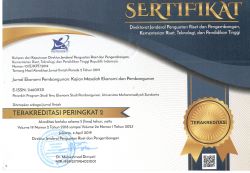Mapping Of Provincial Food Security In Indonesia Using Based Clustering Model
Riski Sayuti Rahayu(1*), Yunastiti Purwaningsih(2), Akhmad Daerobi(3)(1) Faculty of Economics and Business, Sebelas Maret University
(2) Faculty of Economics and Business, Sebelas Maret University
(3) Faculty of Economics and Business, Sebelas Maret University
(*) Corresponding Author
Abstract
Indonesia was known as an agrarian and maritime country, should not experience difficulties in fulfill food needs or having high food security. However, it is a formidable challenge for the Indonesia to meeting food needs. The low level of food security was caused more by Indonesia's geographical conditions in the form of islands that cause inequality of food production, distribution and absorption among provinces in Indonesia. To reduce the occurrence of food security inequality between provinces in Indonesia, clusters was formed based on food security indicators. Based clustering technique is chosen to overcome the problem of overlapping and the limited availability problem in food security data. The results of research produce 3 clusters based on the classification of food security levels. Based on Bayesian Information Criterion, the most fitted cluster model is a three-cluster model with diagonal distributions. The first cluster consisted of 19 provinces with a classification of middle food security levels, the second cluster consisted of 10 provinces with the classification of the level of high food security, and the third cluster consisted of 5 provinces with a classification of low food security levels. It is expected that the results of this clustering can provide input to the Indonesian government to focus more on 5 Provinces with low food security classification, which focuses on access to food.
Keywords
Full Text:
PDFReferences
Arifiliana, Emi. 2017. Multivariate Normal Based Clustering Kabupaten/ Kota di Jawa Timur Berdasarkan Indikator Kesejahteraan, Tesis, Jurusan Statistika, Universitas Padjajaran, Bandung.
Banfield, J.D. & Raftery, A.E. 1993. “Model-based Gaussian and Non Gaussian Clustering”. Biometrics, 49, 803–821.
IFPRI. 2017. Global Hunger Index. Washington DC : IFPRI.
McLachlan, G.J. and Peel, D. 2000. Finite Mixture Models. Canada : Jhon Willey and Sons.
Nurhemi, Soekro, Shinta, R. I., dan Suryani, Guruh. 2014. “Pemetaan Ketahanan Pangan di Indonesia Pendekatan TFP dan Indeks Ketahanan Pangan.” Working Paper Bank Indonesia, WP/4/2014, 1–66.
Article Metrics
Abstract view(s): 972 time(s)PDF: 955 time(s)
Refbacks
- There are currently no refbacks.















